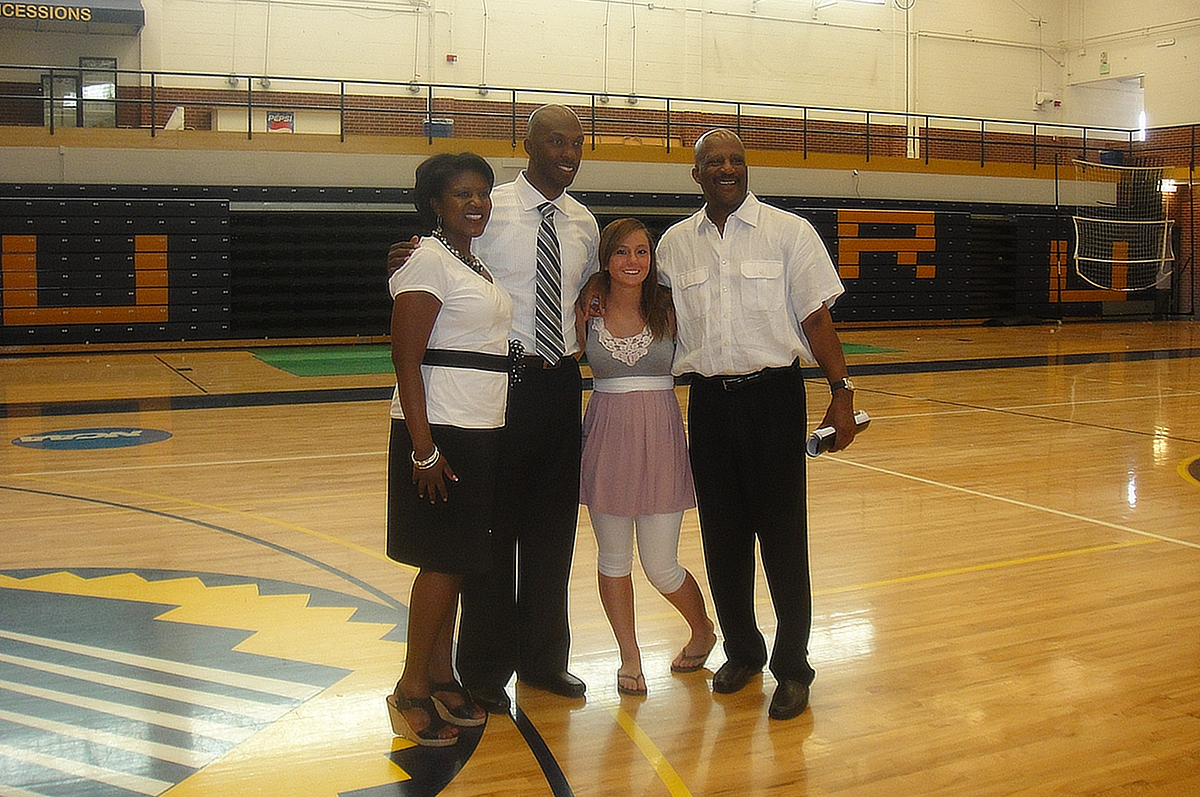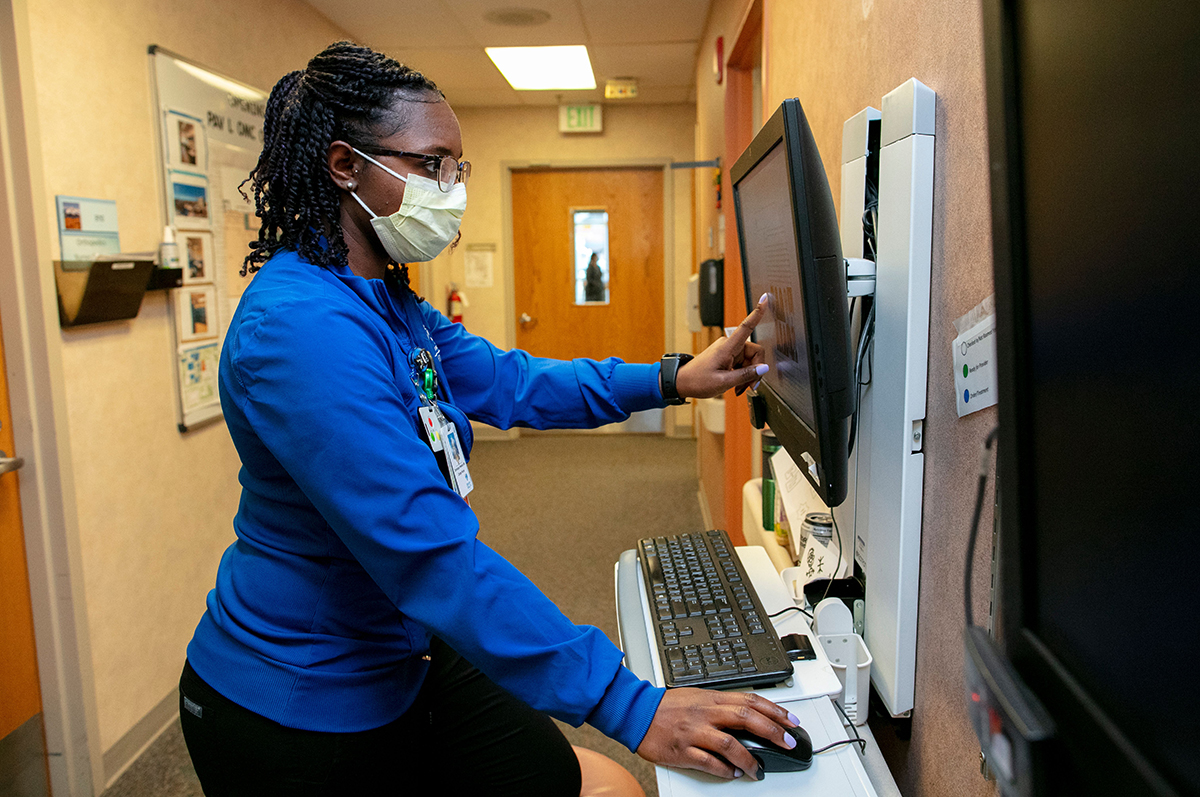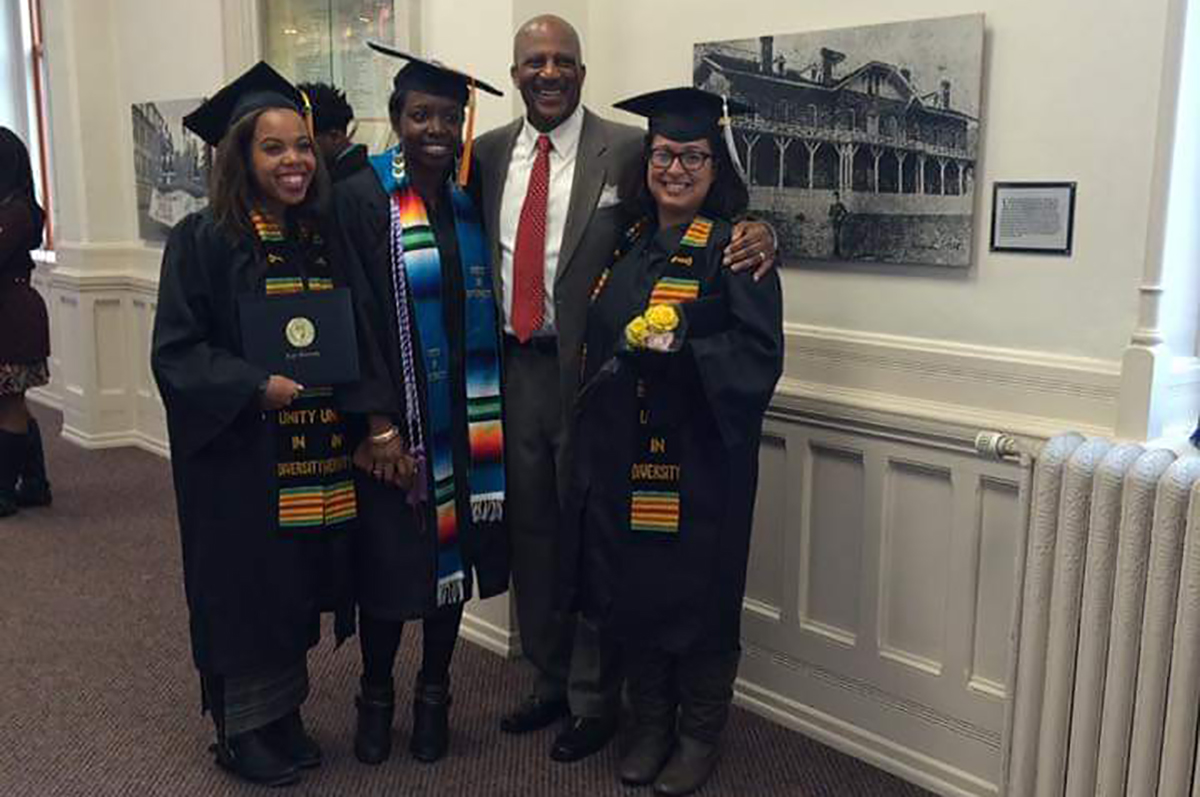Ahead of the Game
Listen to the audio version of this article
As the Porter-Billups Leadership Academy celebrates a quarter-century of helping kids grow to become doctors, teachers, nurses and leaders, the academy is looking ahead to its next 25 years of making a difference.
At an NCAA men’s basketball rules-making meeting in his hometown of Indianapolis several years ago, Lonnie Porter was lost in thought.
Looking out the window, he could almost see it: A boy in an alley shooting a basketball through a makeshift hoop cobbled together with an old fruit crate attached to a shed.
Porter grew up poor. But he had a support system of teachers who believed in him. In seventh grade, they even encouraged him to run for student body president. As often as he could, he’d head over to the alley to set up his hoop. He didn’t know that he’d grow up to not only coach university-level basketball but also to mentor kids growing up in circumstances like his.
But here he was, years later, representing Regis alongside some of the biggest basketball universities in the nation, making rules for the game just blocks from where he’d played crate basketball. As he looked toward the alley, picturing that boy, the rules discussion went on around him.
“Lonnie, what do you think about that?”
The question snapped Porter back to the moment, on the verge of tears.
Porter’s legendary career as Regis University’s head men’s basketball coach landed him in the Colorado Sports Hall of Fame. But that’s only half of his Regis story: For 25 years, Porter has mentored, educated and enriched the lives of at-risk Denver kids. This year, as the Porter-Billups Leadership Academy (PBLA) celebrates a quarter-century of helping kids grow to become doctors, teachers, nurses and leaders, the academy is looking ahead to its next 25 years of making a difference.
Porter founded the Lonnie Porter Leadership Academy in 1996, and in 2006, NBA and University of Colorado legend Chauncey Billups joined as co-executive director, ushering in an era of growth. Each summer, PBLA welcomes more than 200 at-risk students in fourth through 12th grade to the Regis campus. With the help of Porter’s daughter, educator, Regis graduate and co-founder Staci Porter-Bent- ley, the academy developed a curriculum tailored to each grade level. Over three weeks, students participate in learning experiences, including a class about Jackie Robinson’s leadership for fourth graders, human rights discussions in seventh grade and a course about transitioning into high school for incoming ninth-graders. For high-schoolers, the academy provides year-round academic support by working with a teacher who acts as a personal college counselor. All of this comes free for students; the academy is funded by private contributions and the University.
Each year, teachers, counselors and principals nominate elementary-school students for spots in the academy. Nominees must demonstrate leadership and academic skills, positive behavior, parental involvement and community service.
Running the academy is not how Porter envisioned his Regis career. “I thought my mission was to come here and play a bunch of basketball games and take life as it came to me,” Porter said. “And then, in 1995, something happened.”
He remembers the day clearly. Walking across campus, then-Vice President for Student Life Tom Reynolds asked Porter: “Coach, have you ever thought about an academic camp?”
The answer was yes. If he hadn’t become a basketball coach, Porter might have become a headmaster. “I wanted to run a whole program from the time they were little shorties, little kids, until they graduated,” he said. “Reynolds said, ‘Why so young, Coach?’ And I said, ‘You can mold them. You can get your hands on them and shape them into someone who has purpose.’”
Forming the academy, Porter thought about kids in inner-city Denver, growing up a lot like he did: poor and at risk of dropping out of high school.
Like the kid who shot hoops in the alley, they needed someone to make a difference for them.

Stepping onto the Regis University campus as fourth-graders, Dominique Newton and Monique Gonzales weren’t exactly thinking about college.
At the time, “I'm nine. I don't think about the future,” Newton said. “I just want to know what's for dinner tonight.”
The daughter of a single mom, Newton grew up going to “not the worst schools, but not the best schools and, just the situations I was in, sometimes the future can become a little dim.”
What Gonzales remembers most from her early days at the academy are the unlimited grilled cheese sandwiches offered at the cafeteria and racing to be first onto the PBLA vans that took students to and from the academy. Whoever got on first was allowed to choose the music.
Like Newton, she wasn’t yet thinking about college when she first attended PBLA. But, Gonzales said, “... being on this big college campus and getting this different kind of experience, going through all of these different buildings, walking around — it seemed like a dream.”
Years later, the women better appreciate the magnitude of their experiences.
Now a charge nurse at Denver Health, Newton leads a team through their workday, lately caring for COVID-19 patients and administering vaccines. The thought comes up now and then: Would she be there without PBLA?
“And the answer is probably: ‘Not as easily as I’m doing it now,’” Newton said.
The program, she said, took kids “who didn't see themselves having a future and showed a lot of us that we do, and we can do it — and do it well,’” Newton said. “That gave us a lot of self-worth.”
Since she completed the program, Newton earned a full scholarship to Regis, where she earned a nursing degree. For students like Newton who meet certain criteria and Regis admissions requirements, college becomes a real possibility: PBLA awards a minimum of $5,000 to all eligible candidates per year. More funding is available to students with unmet financial needs.
PBLA had prepared Newton for higher education. “For me, just having that experience, I felt already ahead of the game,” she said. “I've been on a college campus before, and I feel a little bit ahead of it.”
Gonzales considered going to college out of state. But ultimately, she was recruited to play softball at Regis. “It was a blessing in disguise,” she said. “College was such a huge transition — more so than I thought it would be. It was such a huge transition that being someplace familiar was more helpful than I ever thought it would be.”
She went on to attend pharmacy school at Regis, and now works as a clinical pharmacist at Lutheran Medical Center in Wheat Ridge, Colo.
Now Gonzales’ memories of PBLA stretch far beyond grilled cheese sandwiches. “The biggest thing that carries through is what leadership is,” she said. “Leadership is standing up when you feel at odds, or maybe you’re scared, or maybe you’re not sure this is the right thing to do ... That is a skill I developed when I was really small.”
The academy generates story after story like this, and for Porter and Billups, that’s the point.
“What I love about our academy is that most of our kids aren’t set up to win at all. They’re dealing with a lot of different adversity at home and some really tough circumstances. So, when they go off and win, that win feels a lot better,” co-executive director Chauncey Billups said.
PBLA gives underprivileged kids a shot — and its founders know what it’s like to need one.

PBLA and Regis graduate Dominique Newton care for COVID-19 patients as a Denver Health charge nurse.
Photo: Barry "Bear" Gutierrez.
Before he became Most Valuable Player in the 2004 NBA Finals and before he earned the nickname “Mr. Bigshot,” Chauncey Billups was growing up in Denver’s Park Hill neighborhood, a much different place than it is today.
“When I grew up there, it was mostly Black. There were a lot of gangs, a lot of drugs, a lot of crime every single day in the neighborhood,” he said. “It was tough.”
Billups was fortunate: Both of his parents worked, and his home life was stable. He saw what life was like for the other kids in his neighborhood, though. “Most of my other cousins and my friends and people that I grew up with weren’t so lucky,” he said. “So, I connect with these kids in a way that is beautiful. I know the trials and tribulations and struggles that they all are seeing and that they go through, be it family or pressures of the neighborhood. I’ve seen it all.”
Billups was nine years old the first time he met Lonnie Porter. “He was this magnetic personality ... a pillar in the African-American community,” Billups said. “I used to hear so many stories about this great coach, but not only that — this great man that was really raising so many inner-city kids that were hopeless. He was a father figure to so many people.”
As Billups made a name for himself in basketball, he occasionally connected with Porter. Their friendship strengthened when Billups moved into Porter’s south Denver neighborhood. Along with one other neighbor, Porter and Billups were the only minorities there.
“Our relationship took off from there, and that’s when I learned about the leadership academy,” he said. “I was, at the time, starting my NBA career, and I knew I wanted something like that. I wanted to be able to give back and give hope and help to so many inner-city, at-risk youth, no matter if they were Black, brown, white, Asian. I didn’t care about that. If you were disadvantaged, and it was a long shot for you to make it, I wanted to be a person you could look to help.”
For students, getting to know Billups went past the thrill of meeting a celebrity.
“What struck us is how much he actually cared about us,” Gonzales said. “It’s different when you’re a kid and maybe you go to a [Denver] Nuggets game and get an autograph or something. He cared about us, and that was just a different feeling. He took time out of his busy life to come hang out with us, come sit in on our classes and come teach us some stuff.”
Billups remembers the impact visits like that had on him as a kid spending time at the neighborhood recreation center.
“And there were so many older males, Black males, Black females that raised me there,” he said. “When I leave my house, I’m in the belly of the beast a lot of times being in the neighborhood. But there were certain times during the year that a Denver Nugget or a Denver Bronco would do community events. I ... never forgot how that made me feel to see a guy like that take time out of his day to come spend time with inner-city, at-risk youth.”
At PBLA, the connection is even deeper.
“That’s one of the things I love about it,” Billups said. “I can connect to kids. It’s not just a surface relationship. We can kind of go deep and talk about what’s really going on.”

For Dominique Newton and Monique Gonzales, the PBLA connections have remained strong. At Newton’s wedding, fellow graduates Josie Nolasco and Miriah Abram were bridesmaids.
On her graduation day, Gonzales expected to cross the stage and collect her degree from University administration, just like every other graduate. As she accepted her diploma, though, she looked up to see Porter smiling back at her.
“I formed that relationship with him through the years, knowing him when I was 10 to finishing pharmacy school at 25,” she said.” Knowing him for that long, and him being the one to show up yet again and give me my degree was just — I don’t even know how to describe it. It was just so special. Watching me grow from when I was being so small to doing what I love and getting my degree—it was unimaginable.”